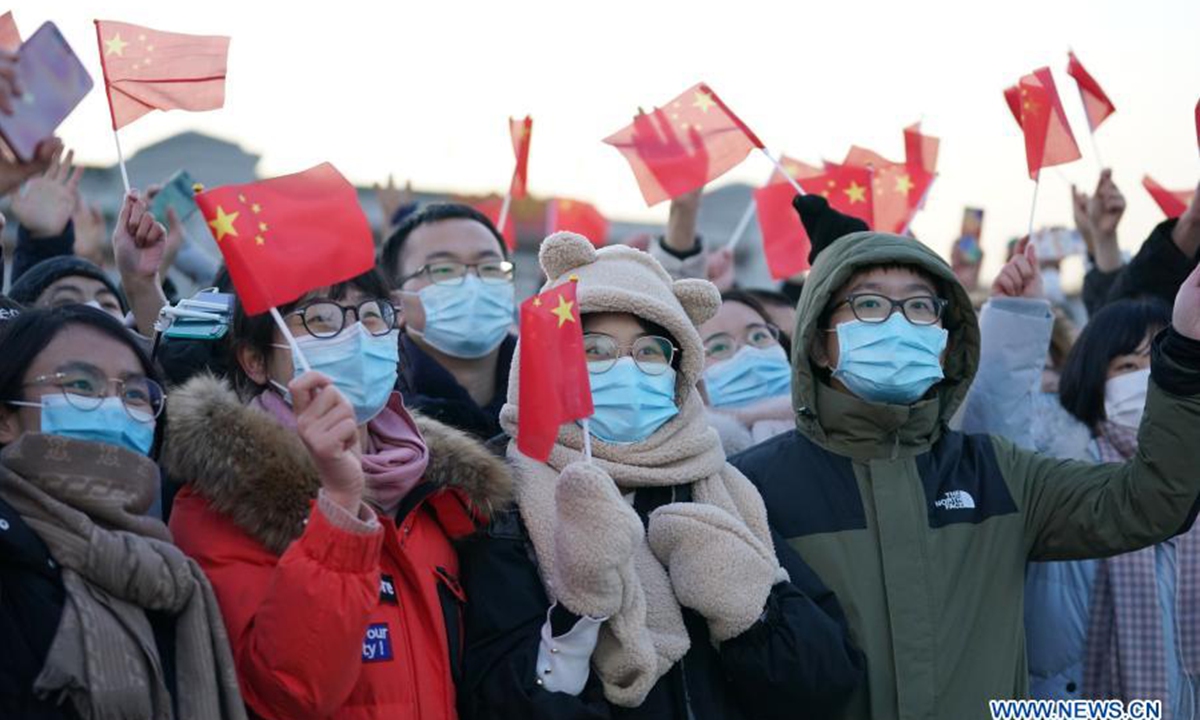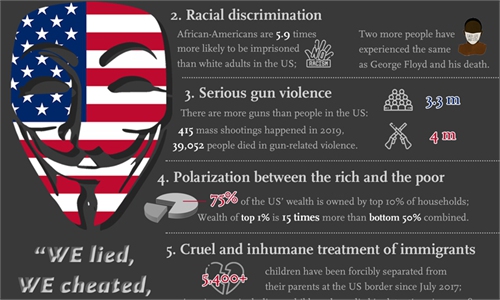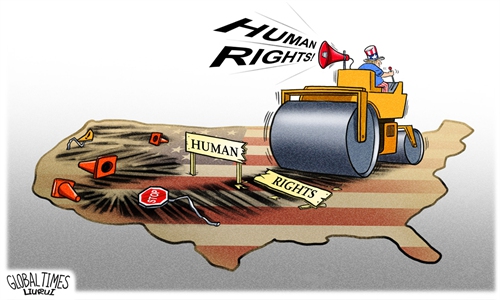
People wave Chinese national flags after a national flag-raising ceremony was held at the Tian'anmen Square in Beijing, capital of China, Jan. 1, 2021. The ceremony was part of the celebrations for the New Year's Day. (Xinhua/Ju Huanzong)
As 2021 begins, Chinese society is elated with success and full of ambition. Sporadic outbreaks in several areas did not affect the mood of the country in ushering in the new year. My colleagues and I continue to guard the country's ideological beacon tower. It is rather quiet, but that quietness also reflects the firmness of the country's shield and the enormous excitement of domestic festivities.
However, looking at the world in 2021 from the beacon tower, we know that challenges will arrive one after another. We cannot avoid repeated attacks from the US and its ideological allies on China over "human rights." We must be sober-minded to embrace this battle.
What are human rights? Human beings have a very broad definition and intuition about them and their pursuit of human rights constantly upgrades and is endless. But each society's actual capacity for human rights is limited with a different point of focus and extent of urgency. For example, preventing the COVID-19 from raging, minimizing its threat to our lives and allowing us to live healthy and free have become the top priority for human rights. This would definitely be a basic experience for all mankind if we view human rights from common sense.
Regrettably, the right to define human rights is largely controlled by the US and its Western allies, which have the powerful tools of ideology and public opinion. They take ready-made individual political rights in Western societies as universal standards for human rights to promote around the world. This not only relieves their own obligation for human rights, but also allows them to easily stand on the moral high ground. Over time, this has become a way for the US to dominate the international order.
The US requires developing countries to implement what is popular in the US and the Western developed world. But most developing countries are unable to handle what seems to "make sense" in the US and the West. Many have even fallen into confusion.
For example, freedom of speech is a good thing, a human right and a shared value of human society. But freedom of speech should match different political conditions. Western-style freedom of speech is deeply embedded in their political systems and it definitely cannot fit into other systems.
As for China, the Communist Party of China (CPC) is the leading force as stipulated by the Constitution. We should explore our own system regarding freedom of speech, but China's freedom of speech must not contain the content of seriously attacking the CPC's leadership. Otherwise, China's constitutional system would collapse. The US and its Western allies have continuously attacked China's freedom of speech, claiming that this is a fundamental flaw in China's human rights. Their main purpose is to disrupt China's political system and drive the nation into chaos.
In fact, the US' human rights system has major flaws. With massive wealth, the US is facing severe social division, leading a massive number of people to live in poverty. The COVID-19 has infected more than 20 million and killed more than 340,000. In addition, there are a large number of shootings in the US that it cannot eliminate. These facts clearly show that there are serious loopholes in the US' human rights system. However, US public opinion deliberately does not link these with the definition of human rights, thus creating the illusion that the US' human rights system is flawless.
Some say that it is an indisputable fact that the US' human rights system is attractive. But this is just an illusion. What attracts people to the US is not its human rights, but its comprehensive advantages as a developed society. India's political system and the principle of human rights are similar to that of the US, but does India possess the same level of attractiveness as the US? If the US does not have a comprehensive foundation of a developed society and only has empty talk of human rights, then it is nothing.
China started in extremely backward and archaic conditions. Development is the foundation for China to build a modern human rights system. Objectively speaking, China's overall progress has been quite impressive. Its human rights system has been continuously expanded in both scale and content. There are some things that the US is good at but China cannot handle at the moment. But China has performed outstandingly in other areas. In balanced view, China is by no means losing in the field of human rights.
Ordinary Chinese now live a life with much better quality and dignity than 20 or 30 years ago, not to mention 40 years ago. This is a very real experience for most Chinese people. For this reason, when the US and the West classify Xinjiang and Hong Kong as "human rights issues" to pressure China, the Chinese people feel severe resentment for them and get the sense that they are abusing or even tainting the concept of human rights.
China is a socialist country, and putting people at the center is the true purpose of China's political system. Continuous development of human rights is an inevitable choice for this country. The so-called undermining of human rights is definitely not China's policy orientation. Some Western political elites who do not conceal their prejudice and moral arrogance have lambasted China on human rights issues, severely undermining the foundation for dialogue over human rights - leading the two sides to stick to their own talking points and gradually fail to understand each other.
The Chinese people must believe that it is the Chinese government that cares the most about the nation's human rights cause, not the US or any Western government. The US is so picky and selfish on trade issues and trying its best to contain China's development. How can it care about China's human rights at the same time? Human rights are based exactly on all the things on which the US is cracking down. Are some US politicians really trying to treat the Chinese people as fools?
Indeed, we need to admit that China has its own weak spots on human rights. We should not regard freedom of speech as a bad thing just because the US is suppressing China in this area and we want to fight back. Freedom of speech is written into the Constitution of the People's Republic of China. We will practically handle the relationship between the right of freedom of speech and other rights, and gradually broaden the room for its development. However, we should never think that there is a possibility for it to develop in China like what the West demands.
I wrote this article while having a drink in a corner of a shopping mall. My surroundings are bustling with noise and excitement. People are enjoying the holidays and celebrating the New Year. I believe in this corner is the microcosm of the real benefits for the Chinese people from the country's pragmatic treatment of development and human rights. Human rights are not far away in the clouds. It exists in our daily lives.
The author is editor-in-chief of the Global Times. opinion@globaltimes.com.cn




